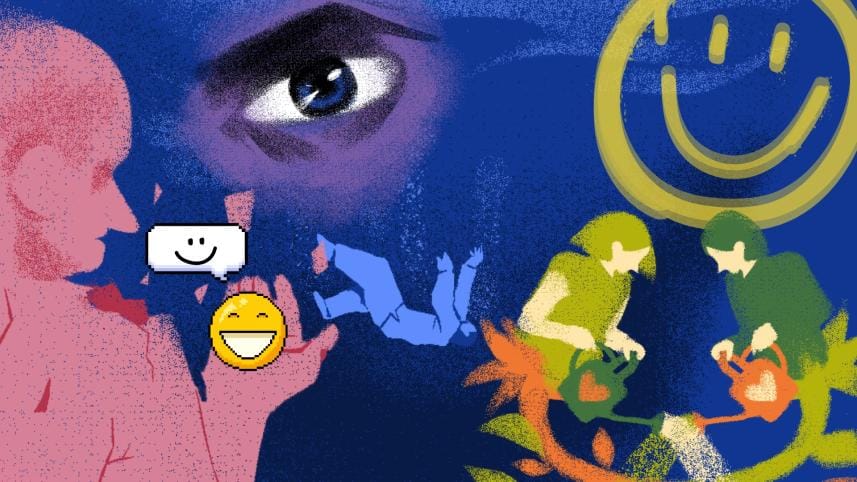The weight of toxic positivity

You can make as many plans as you want in life, but life might have different ones in store for you. And when that happens, what we need is our parents, family, and friends to be there for us, to help us navigate all the lows and highs we experience along the way.
And it's during one of these lows you might have been told to "stay positive". It's often said with warmth, sometimes even urgency, like a life raft tossed to someone who's clearly sinking. You might be struggling with a difficult semester, recovering from heartbreak, or simply feeling exhausted by the weight of everyday life, and someone says it: "At least you have…" This familiar phrase is often said without much thought.
Yet instead of comfort, what you feel is pressure. Instead of understanding, you're met with a polite kind of dismissal, an invisible suggestion that your feelings are too much to be heard fully. It wraps itself in warmth but leaves little room for honesty.
And most of the time, it's not meant to hurt. It comes from people who care, who want to see us smile again. Our support systems offer what they can, which is often just a well-worn phrase. "Don't worry, things will get better"; "Think positive thoughts"; "Everything happens for a reason"; and so on. They're trying to help.
Sometimes, what we really need is someone to just be there, listen and maybe even tell us how bad it is.
Part of the reason this mindset is omnipresent is because of the self-help culture. Entire sections of bookshops and TikTok are dedicated to reframing your thoughts, visualising success, and practising gratitude. There's nothing wrong with optimism; it can give us strength and perspective — but the problem comes when positivity is treated like a cure-all. If you're unhappy, the message seems to be that you're not "positive enough". So now not only are you hurting, but you're also guilty for hurting. Self-help turns into self-blame.
Our generation is caught between two extremes. On one side, we've inherited deep cultural values of resilience and stoicism. On the other hand, we live in a hyperconnected world where positivity is constantly packaged, sold, and reposted. Your feed might be filled with motivational quotes, productivity hacks, and reels of people seemingly thriving. And when you're not thriving, it feels like not feeling okay is a flaw that needs to be corrected.
This creates a strange inner conflict. You're sad, but you feel guilty about it. You're burnt out, but you remind yourself that others have it worse. You want to talk but worry that you'll come across as dramatic. So, you stay quiet. You nod when someone tells you to "look on the bright side", even if all you really want is an ear to listen or sympathise with you.
The problem with this kind of relentless positivity is that it leaves no space for the bittersweet complexity of human emotion. It reduces everything into digestible advice — be grateful, be strong, be happy. But life isn't always neat. Grief doesn't follow a schedule. Anxiety doesn't disappear with a positive mindset. And pretending to be okay isn't the same as healing.
Experiencing difficult emotions is a part of being human. Sadness slows us down, forces reflection. Anger can point us toward injustice. Loneliness makes us crave connection. When we suppress these feelings in the name of "positivity", we don't erase them — we bury them. And buried emotions don't disappear; they quietly shape how we see ourselves and others. Over time, we may start believing that struggling is something to be ashamed of.
Another strange conundrum is the typical phrases that are supposed to provide comfort but really do the opposite. "Everything happens for a reason" might be true, but it's also the wrong thing to say to someone grieving, because no reason at that time is good enough to lose a person you love. Comparing others' struggles invalidates theirs; sure, their struggle might be small comparatively, but for them, it's hard. If you think about it, you might realise you have been conditioned to say these words automatically to your loved ones because they're the only ones that come to mind.
Maybe it's possible to redefine what it means to be "positive". Instead of forcing ourselves to be cheerful all the time, we can practise honesty. We can allow ourselves to feel deeply without apology. We can make space for real conversations if they want to talk or simply be present.
Real support doesn't always sound like a pep talk. Sometimes it's saying, "That sounds really hard," and meaning it. There's something powerful in being seen fully in joy and in pain. That's the true connection. It's not that optimism is bad. Hope matters. Gratitude matters. But so does truth. So does complexity. There will be days that feel heavy, and that doesn't make you broken. It is simply life, and we all must live.
Tinath Zaeba is an optimistic daydreamer, a cat mom of 5 and a student of Economics at North South University. Get in touch via tinathzaeba25@gmail.com



 For all latest news, follow The Daily Star's Google News channel.
For all latest news, follow The Daily Star's Google News channel.
Comments